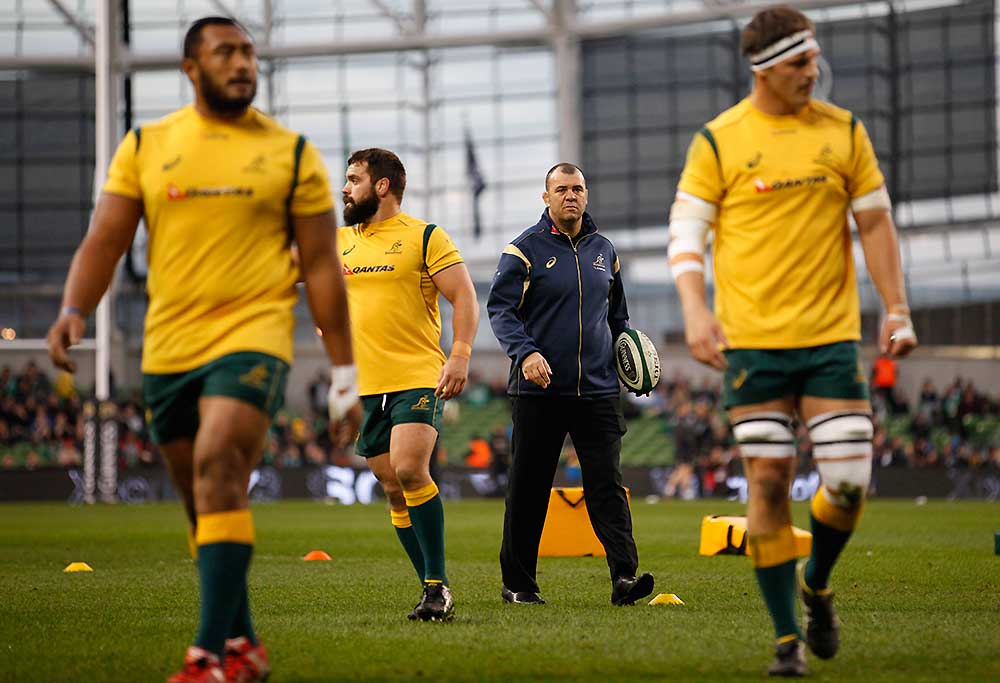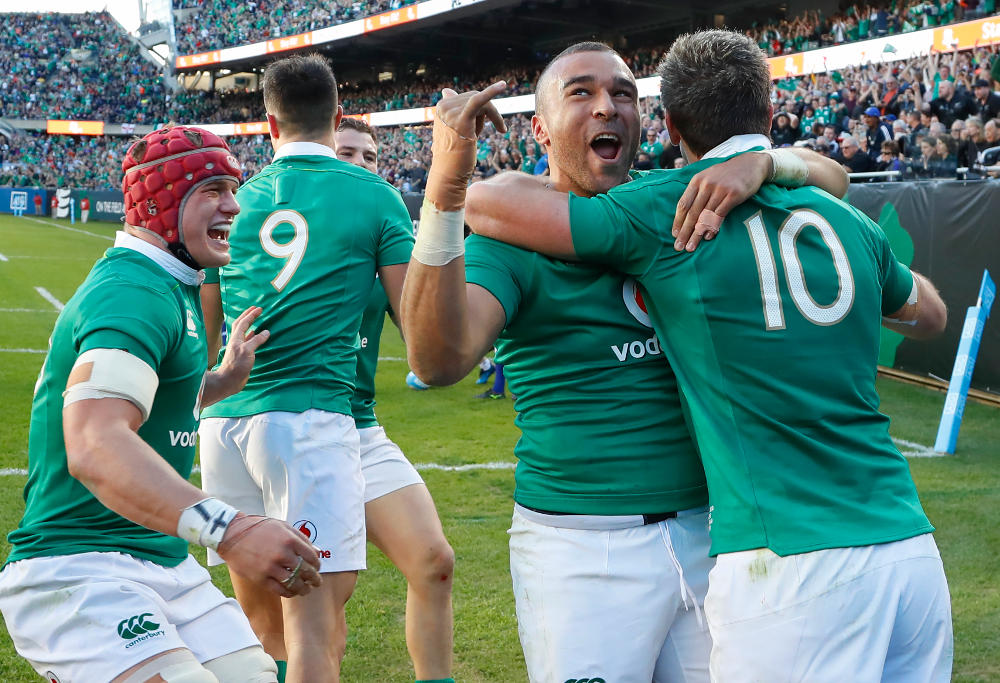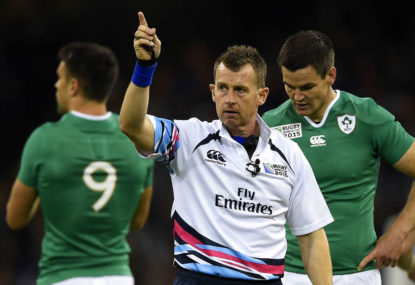It is the way teams and supporters accept defeat, rather than victories, that defines them.
With this truism in mind, one has to say that Ireland and its supporters have revealed an unfortunate whingeing and self-satisfied front to the world of rugby after their loss last weekend to the All Blacks.
This isn’t just me saying this. Duncan Johnstone, the very fair New Zealand rugby caller told readers that “Ireland seems to have changed since they beat the All Blacks at Chicago … suddenly they are ‘mightier than thou’. But if you’ve beaten the best and want to be the best, then start acting like the best.
“The outpouring of Irish outrage against the All Blacks following their 21-9 win at Dublin last weekend has been the equal of anything that has emerged from Fleet Street on previous tours.”
Ireland, the happy warriors of rugby, everyone’s favourite second team, have been the Irate Irish.
The All Blacks accepted their defeat by Ireland at Chicago several weeks ago for what it was, a comprehensive thrashing by a better-coached, more physical, smarter and dynamic opposition.
Then, being the All Blacks, they went away and studied what had gone wrong. Then they put in place the strategies and the tactics needed to turn around their performance and result at Dublin from what happened to them at Chicago.
That opening onslaught which culminated in Malakai Fekitoa’s try was vintage All Blacks play in revenge mode, from capturing the opening kick-off to the terrific pressure exerted on Ireland from backs and forwards literally throwing themselves into the attack.
The All Blacks scored three tries to none, ran for 480m to the 320m by Ireland and made 12 line-breaks to the four they conceded.
They also matched the intensity and physicality of Ireland, something they did not do at Chicago.
There is a lesson here for the Wallabies at Dublin over the weekend. Fight fire and passion with Aussie fire and passion, tempered with skills and exact execution on attack and defence.
During the Dublin Test, too, it was clear that Ireland had been coached to put intense pressure on the referee. The intention was to get the officials to ignore Ireland’s own and sometimes cynical infringements and to concentrate virtually exclusively on those of the All Blacks.
From the commentary on television and from the media coverage after the Test, it was clear that the Irish rugby media was in on the act.
Steve Hansen was correct to ask the post-match interviewer whether she was claiming with her loaded questions that the All Blacks were a “dirty team.”
The Irish media maintained this line throughout the week, especially with their hounding of Sam Cane whose tackle on Robbie Henshaw created a clash of heads and Henshaw being stretchered off the field.
During a discussion of the incident, which was really instigated by the braying of the crowd yelling for a yellow or red card, the South African referee Jaco Peyper could be heard conceding that the tackle was around the shoulders, not above the shoulders.
Despite this confirmation of the legality of the tackle but Cane was still penalised. And, astonishingly, brought before the World Rugby judiciary for some sort of punishment. Wiser counsels ultimately prevailed.
But the Dublin crowd has shown its hand.
After virtually every break in play, moreover, you could hear Rory Best, Ireland’s excellent hooker and captain, go up to Peyper and complain about head-roll tackles, high shots, offsides, anything and every thing the All Blacks were doing or weren’t doing.
The Wallabies need to be prepared for this crowd reaction and for Best trying to run the game for the French referee Jerome Garces.
The irony was that Ireland were as guilty of tackles going wrong (Sean O’Brien on Kieran Read, Johnny Sexton on Beauden Barrett, for instance) as the All Blacks they were complaining about.
Best was supported by a partisan crowd that (admirably) went silent for kicks at goal and when, towards the end of the Test it became obvious that Ireland were going to lose.
But earlier in the Test they exploded with belligerent roars and chants when Ireland were surging forward.
I noticed, too, that Irish officials standing on the sideline were yelling to the referee about alleged All Blacks misdemeanours.
Again, Cheika needs to have his officials on the sidelines ready to make complaints about this Irish gamesmanship when/if it happens against the Wallabies.
The French call the crowd “the 16th player” for the home side. And this was true for the Irish supporters and will be true when the Dublin crowd try to influence the French referee Garces to support Ireland with his rulings rather than the Wallabies.

Michael Cheika has coached successfully in Ireland. He knows how these things work. Hopefully, he will have the Wallabies prepped up in knowing what to expect at the weekend when they play the third of the four Grand Slam Tests on this year’s tour.
Player discipline is crucial for the Wallabies. They can’t hope to win if there are brain explosions along the lines of those exemplified by Will Skelton already on this tour, and earlier in the season against the All Blacks.
Stephen Moore’s captaincy, too, will come under the spotlight. He needs to be quietly firm when Best tries to turn the referee to Ireland’s cause with his honeyed accusations against the Wallabies.
But this response to Best doing his worst should not be done in the hectoring manner that Moore adopted earlier in the year.
The tone should be respectful but firm and informed, a method he has used successfully so far on the tour. You catch more flies with honey than with vinegar, after all.
And Cheika himself needs to maintain the admirable behaviour in the coaches box he has demonstrated throughout the tour.
Earlier in the year, I criticised Cheika for going rogue on his responsibilities as the national coach. He has taken criticism like this to heart, it seems. I have nothing but admiration for the way he has handled himself and the team on the tour so far.
I particularly like the way he is bringing in the young blood to the squad by allowing them to play for and against Barbarian sides.
Moreover, the younger or less experienced players he brought into the Wallabies for the Test against France came up well from the experience.
The point I was trying to make when I criticised Cheika’s decision to bring back the veterans from France, Matt Giteau, Adam Ashley-Cooper and Drew Mitchell, was that it prevented younger and better players from being blooded into Test rugby.
Two standouts for the Wallabies against France were Kyle Godwin and the fullback Luke Morahan.
These were two players of many who were penalised by the return of the French veterans.
I suppose Cheika will argue that introducing new blood into the Wallabies needs to be done with care and is probably best done on tour, which he has done.
My argument is deeper than this, though. Super Rugby is a better preparation for Test play than rugby in Europe, where the length of the season and the conditions, often wet and cold, tend to reduce even the best thorough-bred players to clumping work horses.
Anyway, the end result is that Cheika has widened his pool talent going into 2017, which must be a good thing for the Wallabies.
Getting back to the Test at the weekend, the key for the Wallabies will be containing or trying to contain Ireland’s back three.
The South African/Irishman C.J.Stander went off after 22 minutes and was replaced by the Dutch born and aptly-named Josh van der Flier. These two players, in combination with Sean O’Brien and Jame Heaslip, formed a formidable loose forward trio that over-shadowed their All Black counterparts.
The Ireland back three made 28 per cent of all Ireland’s tackles, missing only one. They made 40 per cent of all the metres run and 33 per cent of all the carries.
Clearly, if Ireland’s back three perform this well against the Wallabies, they could carry the home side to a victory.
Equally clearly, if the Irish back three can be contained, then the Wallabies have a good chance of keeping their Grand Slam hopes alive. Ireland don’t have much on attack if their rolling maul is contained and if they can’t win penalties at the ruck.

The key for the Wallabies is some dominance at the ruck. They should be able to do this, if aggression is met with aggression. And this can and should be the case. The fact is that David Pocock is as tough a digger for the ball as O’Brien. He won four turnovers by himself against France.
The contest between Pocock and O’Brien could decide the outcome of the Test, in fact. Here is Pocock’s chance to distinguish himself against an opponent who is regarded as the best No.7 in Europe.
Ireland have another tactic that the Wallabies need to be prepared to resist, as well.
Against the Wallabies at Eden Park in their pool round match of the 2011 Rugby World Cup tournament, Ireland confounded their opponents with their tactic of holding up the Australian runners and forcing turnover mauls.
They were not able to do this at Dublin against the physical All Blacks.They did try one mid-field maul which resulted in a penalty for them.
I would expect the tactic of the maul-tackle and the mid-field maul to be trundled out against the Wallabies who are less physical, muscular and abrasive in their defence than the All Blacks.
If Cheika can devise tactics to successfully thwart Ireland with their use of this “holding up” tactic, he will have gone a long way to setting up a Wallabies win.
Here we have a test of Cheika’s ability to out-coach Joe Schmidt who is regarded as one of the best coaches in world rugby.
At the beginning of the tour, the Wallabies chances of pulling off the Grand Slam were dismissed by Scotland’s legendary player and coach Ian McGeechan because they had “definitely regressed” with their physicality.
Cheika dismissed this criticism and insisted that “it’s important for us to play our style … with more running, and more attacking football because that’s our way, the Australian way.”
I applaud this sentiment. But add the caveat that there is an old, wise rugby saying that before you can run the ball successfully you have to at least establish some parity in the forward clashes. The loss of Adam Coleman to this go-forward momentum for the Wallabies is a huge one, but hopefully not insurmountable.
The way to confound Ireland’s tactic of holding up the tackled player is to go into tackles with shoulders square, body bent, the head leading and with a strong leg drive.
This will be a key factor to watch out for in the early skirmishes of what promises to be a terrific Test.
Before the Wallabies embarked on their European tour, the pundits (me included) wondered if they could win more than two Tests. They have won three out of three.
The tour is already a success for Cheika, I would argue.
Somewhat fearfully, too, I make the prediction that the Wallabies will make it four out of four Tests won on this Grand Slam tour with their victory over Ireland at Dublin.































































































